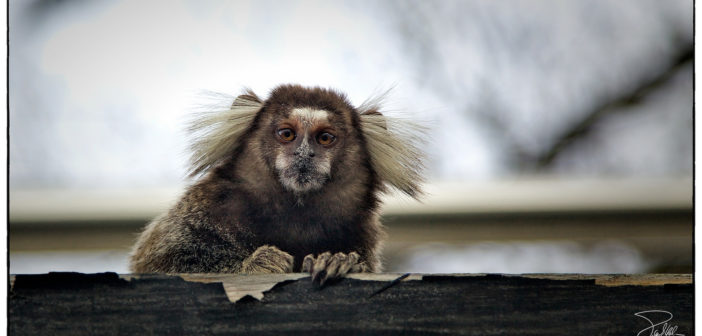Parkinson’s United Kingdom (UK), through their drug development arm Virtual Biotech, will give more than £780,000 [over one million United States dollars] to fund work which will include testing a drug named NLX-112 on primates. The research will be in partnership with drug company Neurolixis and with King’s College London, which houses a colony of marmoset monkeys. Parkinson’s UK stated on their website that the study would include “safety and efficacy testing in a marmoset model of Parkinson’s.”
Although details of exactly what the monkeys will suffer have not been made public, the usual way in which Parkinson’s is ‘modeled’ in marmosets is by giving them a series of injections of a chemical called MPTP. This is known to cause severely debilitating, distressing effects and Parkinson-like symptoms, including paralysis and total loss (or extreme slowness) of movement, rigidity, loss of vocalization, lack of muscle movement including eye rigidity, lack of coordination, uncontrollable body tremors and a hunched posture. We have previously reported how, at this stage, monkeys have been force-fed, over many days, with L-DOPA, a drug for Parkinson’s Disease, to induce symptoms of dyskinesia (uncontrollable body spasms, writhing and twisted body posture). Once these symptoms are present, a drug or some other intervention will then typically be given in an attempt to alleviate them.
In addition to the terrible suffering caused by using monkeys in such experiments, Parkinson’s disease (PD) cannot be reliably modeled in primates for a number of reasons. Perhaps most importantly, monkeys do not get Parkinson’s, and the symptoms induced by having their brains poisoned fail to replicate key features of the disease. For example, Parkinson’s in humans is a degenerative disease, whereas these monkeys gradually recover. Notably, monkeys do not develop Lewy bodies, which are clumps of abnormal proteins and a key hallmark of Parkinson’s disease, found in the brains of human patients. Finally, marmosets do not suffer from rest tremor, which is an important symptom experienced by Parkinson’s patients. It is clear that the results of this experiment will tell researchers very little about how Parkinson’s functions in humans.

Common marmosets engaging in grooming behavior. Grooming is just one element of the complex social lives marmosets naturally have. Image credit Dr. Nasser Halaweh, CC BY-SA 3.0.
The Michael J Fox Foundation (MJFF), which awarded Neurolixis four grants between 2011 and 2014, stated that “The next step is to evaluate NLX-112 in PD patients with moderate to severe LID in a Phase 2 clinical study.” This begs the question of why primates are being used.
Says Jessamy Korotoga, Animal Aid’s Animal Experiment Campaign Manager, “This drug has already been tested in primates, cats and rodents, and has previously been given to human patients in trials to alleviate pain. The terrible effects of ‘modelling’ Parkinson’s in primates are known, as are the differences between Parkinson’s in humans and the ‘model’ in primates. We urge Parkinson’s UK to turn away from unreliable animal research and to instead use cutting edge, humane, non-animal methods.”
Animal Aid is not alone in condemning the use of primates in research. Dr. Marius Maxwell, an Oxford, Cambridge and Harvard-trained neurosurgeon, has strongly criticized, on scientific grounds, the use of MPTP-poisoned monkeys as a ‘model’ for Parkinson’s Disease (PD) research. Dr. Maxwell said, ‘It is widely acknowledged that profound disparities (anatomical, physiological, neurochemical, pathological, and temporal) exist between the MPTP non-human primate model and humans with idiopathic PD. Despite these paramount concerns regarding human reproducibility, hundreds of studies involving thousands of animals have followed with conflicting and non-predictive results.”

A medal given at a fundraising walk for Parkinson’s UK. Many people who donate or help fundraise for a particular charity have no idea when that charity is funding cruel and outdated animal research. Image credit Darren, CC BY-SA 3.0.
Since we first told our supporters about the experiments, almost 4,000 people have contacted Parkinson’s UK to voice their opposition. This is a great start but we need more help to stop these cruel experiments. If you haven’t already contacted the charity, please do so now via email and Twitter, and spread the word by sharing this article on Facebook and Twitter.
Featured image: a common marmoset, the same species housed at King’s College London and proposed to be used in Parkinson’s UK study. Image credit Frank Kehren, CC BY-SA 3.0.





